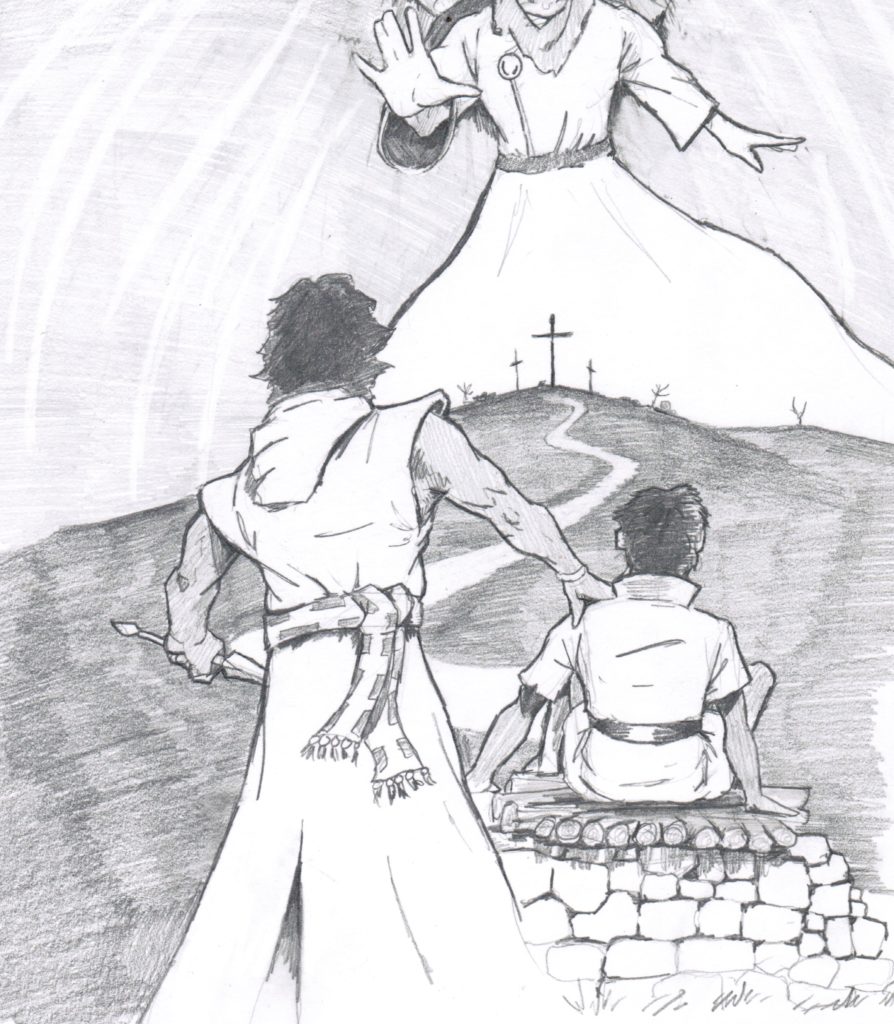PHILLIP O'REILLY
In a conversation with the religious leaders of His day, Jesus used an illustration that is lost on many in our non-agrarian culture. “I am,” He explained, “the door, if anyone enters through Me, he will be saved, and will go in and out and find pasture.” (John 10:9, NASB)

With this statement, not only did Jesus explain that He is the only path to salvation but also assures those who come to Him that they will have security within His fold.
Jesus was not, apparently, referencing any wooden barrier as the nearby photo verifies. There is no man-made door on the sheepfold Jesus invites us to. He, Himself, is the door. As Tolkien’s Aragorn assured the men of Gondor who were concerned that the city’s gate had been destroyed, “[M]en are better than gates, and no gate will endure against our Enemy if men desert it.” Hope in any manmade barrier is vain, for every gate, every door can be breeched by the Enemy.
However, the man Jesus is better than any door. For He will not desert His position when the Enemy attempts to assail His sheep. His sheep can rest in the security that only God come in the flesh can provide.
If you would have this security, then Jesus bids you to the entrance of His sheepfold. If you come, He will step aside and welcome you in. There you will find life. Not only that but the life He offers is not some what-rule-do-I-have-to-keep-now tedium; rather it is joyous life, a life of freedom, life in abundance. (John 10:10)
You may have heard the slang expression that so-and-so is “older than dirt.” This bit of exaggeration lends spice to succinct language, but it raises a question: how old is dirt anyway? Put another way, how old is the earth?

There are many types of scientists. Men and women who study how mountains and valleys are formed are called geologists. Folks who study plants and animals are called biologists, while those who study the planets and stars are called astronomers. Many scientists believe the earth is millions of years old. Their claim is based upon observing the fossil record and upon the time necessary for light to get to earth from the stars. In general Christians who lived before the 20th century believed that God created the earth about 4,000 years before Jesus was born. So who is right?
The short answer to this question is we are not certain. People who have studied this disagree. What Christians believe is that God made the world ex nihilo. Whether He chose to make it in 6-days just over 6,000 years ago or to make it over millions of years is debated still.
My opinion is that a natural reading of Scriptures leads to the conclusion that the earth is not older than 10,000 years. One must explain away a lot of Scripture to accept otherwise. Still, this is a topic upon which true Christians can disagree.
Now some will respond, “Well, you have to ignore a lot of science to believe that.” That would depend upon the whose assumptions are correct. There are problems with tools such as carbon dating which are used to determine how old “dirt” is – well, rocks, actually. But let us lay those problems aside. If carbon dating is to accurately measure elapsed time, things must have continued on in a consistent fashion. I call this the continuity assumption. It means nothing could have come along to screw up – there I go using technical scientific terms again – the timing mechanism which carbon dating relies upon. That is nothing “discontinuous” can have occurred during the eons being measured. (Discontinuous is the from Latin:disor “not” and continuare or “to continue” and thus means “not to continue.”[1])
However, God created the heavens and the earth (Gen. 1:1) That event puts the dis in continuousor nothing else does. To put it simply, God’s creative act raises a veil beyond which no tool of the scientist can gaze.
If you doubt that, consider this example. There are ways a coroner can estimate when a person died. These too rely upon some continuity between when the person expired and when the tests are run. In John 11, we learn Jesus raised a friend of His, Lazarus, from the dead. Suppose a day or two after this event, someone took Lazarus to a coroner and said, “When did this man die?” Let us assume the coroner actually saw the miracle, so he does not think you off your rocker. His tools could still not answer your question, why? Because a discontinuous event occurred since Lazarus’ death: the Lord Jesus made him ALIVE.
So yes, theologians do not know how old the earth is. But if we are logical – and honest – we must admit that scientists do not know either. Both draw their conclusions based upon assumptions which cannot be proven using science or logic.
[1]discontinuous. https://www.etymonline.com/search?q=discontinuous, Web. 14 Jun 2019

Google Maps™ once directed our family down a “road less traveled.” The road continued to narrow until we finally came upon a sign reading:

You cannot make this stuff up! I would have taken a photo of the sign, but I didn’t want any incriminating evidence on my body if something went wrong. The Search and Rescue Team (“SRT”) stays busy in that area apparently.
Before going any further, stop and read John 3:31-36 in either the NASB or the ESV. This passage teaches us about what theologians call the exclusivity of Christ. Jesus claims He is the only way to God. This teaching was no more popular in Jesus’ day than it is in ours. Is the anger over this teaching justified? Is it “fair” that God requires we come to Him through Jesus? Let’s think about that.
SRT’s are dispatched to wilderness areas when people go missing. When a SRT comes upon the wayward traveller, does SRT’s arrival make the person lost? Of course not, the person was lost before. Suppose the lost person refuses SRT’s aid, flees into the wilderness, and dies… still lost. Would you blame SRT and say, “If SRT hadn’t gone searching, they would have been okay!” No. The person should have turned from their way and followed SRT out of the wilderness.
Similarly, Jesus came to rescue mankind from his sinful rebellion. He did not make men and women lost. We were lost before. Indeed, the prophet Isaiah tells us we were hopelessly separated from our Creator because of our rebellion:
Behold, the LORD’S hand is not so short That it cannot save; Nor is His ear so dull That it cannot hear. But your iniquities have made a separation between you and your God, And your sins have hidden His face from you so that He does not hear.
(Isaiah 59:1-2, NASB)
Not only that but we were living under God’s condemnation for our rebellion. If a rebel flees when Jesus shows up, he remains lost and under judgment as Apostle John says, “he who does not obey the Son will not see life; but the wrath of God abides on him.” (John 3:36) In other words, the wrath of God was upon the person when Jesus initiated His rescue mission to remove it. If the person rejects Jesus, God’s wrath remains.
It would be silly to blame Jesus for making the rebel lost, but many people do. We are rebels, and rebels, by nature, resent being told they are wrong. We also resent bringing our beliefs into conformity with the truth. This resentment is not a condemnation of the truth, however, but evidence of the rebellion which Jesus beckons them to turn from.
The man or woman who turns back and follows Jesus is rewarded, as John writes earlier in the same verse. Here is the whole verse:
He who believes in the Son has eternal life; but he who does not obey the Son will not see life, but the wrath of God abides on him.
(John 3:36, NASB)
So we cannot blame Jesus for our lostness or the wrath we are under. If you have not done so yet, heed the warning sign. Turn back and follow Jesus!

“So why Theology for Young Christians?” When some ask this they mean, “Why should I buy this book my child or to use in my Sunday School class?” Others wonder what possessed a public policy analyst turned economist to write a book on theology. The answers are interrelated, so I will tackle them in reverse order.
G.K. Chesterton reputedly said, “When a man stops believing in God he doesn’t then believe in nothing, he believes anything.” The quote’s attribution may be in question, but fifteen years of teaching in colleges and at churches convinced me the statement’s veracity is unquestionable. Many young people today lack the capacity to reason. The problem is more pronounced at secular schools but is evident at Christian colleges as well. I have found many students from church-going families know Bible stories but cannot bring lessons from those stories to bear on events playing out before their eyes.
Their struggles can be traced, in part at least, to a “dumbing down” of high school education. Many students and their parent permit instructors to substitute videos for reading, conclusions for research, and opinions for logic. Consequently, students landed in my classroom with little practice in developing arguments through a systematic process. They had rarely investigated sources and then drawn inferences from their findings. Theology for Young Christiansgives young people practice doing exactly these things. As students engage in the exercise, they begin to reason from a Biblical mindset.
The importance of developing the abilities to read, infer and reason can hardly be overstated. Read the news. Each passing day brings another “self-evident truth.” As if to ratify anew Chesterton’s quote, people clamor over one another to embrace the new idea. Those who do not avow allegiance to the new philosophy are kicked from the Enlightened Club. And few ever wonder if there might have been sound reasons why the philosophy was once regarded as absurd in years past. Indeed, even Christians may dismiss the well-reasoned position of years past as stodgy and antiquated.
This trend toward accepting increasingly absurd and often immoral ideas as “normal” shows little sign of reversing and may, in fact, worsen. I say “little” and “may,” for hope is not lost. Hope, however, rests on Christian parents and teachers combating the tide. Young Christians must be taught the Scriptures, not in a mechanical and rote fashion, but in a manner that stimulates thinking, questioning and reasoning. The consequences of failure in this endeavor are evident all around us.
As one example, consider the a report from the Center for Disease Control. CDC recently reported that suicide rates have increased by nearly 30% since the turn of the 21stcentury. Doubtless numerous factors contribute to this rise, but Stephen Meyer, the author of Darwin’s Doubt, identified one during an interview: the hopelessness of naturalism creates “existential anxiety.”[1] If the universe truly sprang forth from impersonal forces and life from random mutations, life is devoid of meaning. This is the world our children occupy. Educators and policy makers fret over kids’ poor “self-esteem,” yet they peddle philosophies which rob them of all hope.
Christians err if they concluded similarly inaccurate perceptions do not assault young people within the church.
Our oldest daughter, Rachel, is 30 and active in church ministry. A girlfriend she serves with admitted to never believing herself attractive. Rachel’s face must have displayed some consternation, for the friend asked, “You don’t struggle with that problem?” Rachel assured her she did not. In relating the story to me, Rachel thanked me for instilling this confidence in her. This comment surprised me, because I recall no efforts during Rachel’s time under our roof when I considered how I might instill confidence in her appearance. Although thankful for her attribution, it may be misdirected. This self-confidence, I suspect, is a byproduct of an accurate understanding of God’s character, her own sin and of the gospel. For teaching this, my godly wife gets most the credit.
Laura devoted considerable school time to teaching the Scriptures. Consequently, each child has understood two salient facts. First, God’s justice requires He punish rebellion, and two, they were born rebels. These do not engender much self-confidence. However, once one accepts those facts and then turns to the all sufficient work of Jesus for salvation, confidence springs forth. Our middle daughter’s Sunday School teacher witnessed when Abriel “accepted Jesus.” One week, Abriel was anxious and unhappy. The next, she was confident and joyous. The change emanated from an accurate understanding of her relationship to her Creator, a willingness to acknowledge her own sin and acknowledging that she had to bow before Jesus.
In a similar fashion, Rachel’s confidence before her Creator – a confidence derived from understanding the message of Scripture – spilled over into other areas. Do not confuse self-confidence with self-esteem. Self-esteem made through constant reminders of a child’s beauty or intelligence may create pride but provides little strength for weathering life’s trials. No short-cuts are available for developing godly self-confidence. Theology for Young Christianswas written with this fact in mind. As such, it challenges young people to think about the Bible’s stories, to consider their implications and to gain an accurate perception of God and of all mankind – themselves included.
The Bible remedies hopelessness and instills confidence. It offers a window for gazing at the Creator of the universe who gives life meaning. Moreover, it offers a mirror through which young people gain an accurate self-image. As a father of ten kids, I occupy a front-row seat to many attacks of Satan. Without exception, our children’s defenses against those attacks failed when they trusted their own wits or worldly wisdom and succeeded when they embraced the timeless truths of Scripture.
Theology for Young Christiansprovides a framework for learning these truths. More specifically, the book teaches foundational skills for discerning and applying the lessons embedded throughout the both Old and New Testaments. The book guides readers through Bible passages using tried-and-tested techniques for interpretation and application. Students are asked questions, shepherded through the process of finding answers and challenged to consider how Scriptural principles should impact behavior and thinking. At the end of this process, young people are better equipped to systematically study the Scriptures. Indeed, they will, we pray, be less dependent upon study guides and prepared to study other passages. Then, godly self-confidence replaces any manmade self-image, steels the young person for life’s battles and instills hope for victory.
[1]Ben Shapiro, interview with Stephen Meyer, The Ben Shapiro Show: Sunday Special Episode 43, podcast audio, March 23, 2019, https://www.dailywire.com/podcasts/44986/sunday%C2%A0special%C2%A0ep-43-stephen-meyer